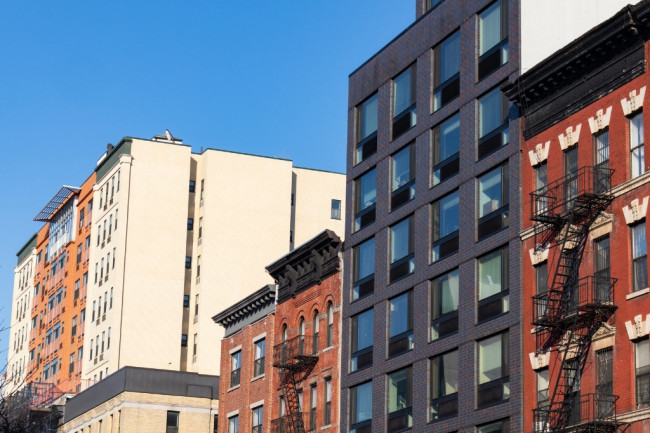Did you win a bidding war? The ‘winner’s curse’ means you likely overpaid
- Most winning buyers first lose a few bidding wars and then bid aggressively to end the cycle
- Manhattan bidding war winners paid an average of 6.1 percent over the last asking price

“Paying above the seller's ask has been a way of life for many buyers coming out of the pandemic, even as more inventory enters the market, said Jonathan Miller.
iStock
Winners of all kinds of auctions tend to overpay and that same downside is experienced by buyers who triumph over the competition in bidding wars for New York City real estate.
Jonathan Miller, president and CEO of appraisal firm Miller Samuel, explored the phenomenon of the “winner’s curse,” a tendency for the winning bid to exceed the value of an item, in a recent edition of his Housing Notes newsletter.
“Paying above the seller's ask has been a way of life for many buyers coming out of the pandemic, even as more inventory enters the market,” he wrote.
He cited a March 2025 white paper, "The Winner's Curse in Housing Markets,” which compared sales of U.S. properties involving bidding wars to those that sold without. Among the findings: Winners tended to have incomplete information or over-optimism and realized lower returns, an average of 7 percent lower
Winning a 30-way bidding war
Miller has first-hand experience with paying above ask: Three years ago, he prevailed in a 30-way bidding war, paying about 36 percent over the asking price for a Ridgefield, Connecticut, house built in 1755.
Losing a prior bidding war for a renovated barn in Redding, CT., had made him more determined to offer the winning bid on the Ridgefield property. Even real estate professionals get emotional about losing out on a dream home.
That determination is a typical scenario for most bidding war winners. Miller described it as an “irrational, emotional drive to win the bid."
“Many of the bidders have lost out in previous auctions and want to end the protracted period of disappointment and get that home. When consumers are faced with losing another bidding war, they go in more aggressively,” he said.
Also fueling bidding wars is a common strategy for sellers and their brokers to price listings close to market rate or a little bit lower—the bidding war subsequently encourages buyers to offer a premium for the property.
“Particularly if inventory is absent, buyers have no choice if they want to win the bid,” Miller said.
Bidding wars low in NYC
The market share of bidding wars in NYC is currently much lower compared to the surrounding suburbs, according to Miller’s data for the Elliman Report, which tracks real estate data (but median prices are much higher).
In the second quarter, bidding wars were involved in about 25 to 50 percent of sales in counties just outside NYC, but only 7.1 percent of all Manhattan deals. Manhattan bidding war-winning buyers paid an average of 6.1 percent over the last asking price (the range was 3 to 8 percent).
For Brooklyn, bidding wars had a 22.5 percent share last quarter and winning buyers paid a range of 3 to 8 percent over asking. In Queens, bidding wars took a 23.8 percent share and winning buyers paid 2 to 5 percent above ask, Miller said.
‘Loser’s curse’ is also real
Mike Fabbri, an agent at The Agency, recently represented buyers in two deals that involved bidding wars, both for Upper East Side, two-bedroom units that were priced around $2 million. They went for 5 to 10 percent above asking.
He said that the winner’s curse is a real phenomenon—many winners wonder if they overpaid, and the opposite, the loser’s curse, is equally prevalent: Buyers who don’t bid high enough feel discouraged about the one that got away.
Much depends on how bidding war winning buyers are using the property. “If you plan on flipping it in five years, yes, it’s likely you overpaid,” Fabbri said. But for bidding war winners who plan to live in the property for 10 to 15 years, that’s not the case. For those buyers, the “value of the apartment is what the buyer is willing to pay,” he said.
When all-cash wins the prize
Lisa K. Lippman, a broker at Brown Harris Stevens, recently represented the seller of a five-bedroom co-op on Fifth Avenue that was asking $12 million.
“We had three cash buyers vying for the apartment and after two back-and-forths with each buyer, the seller accepted an all-cash offer for $13 million,” Lippman said. “All three buyers were intrigued by the property, specifically the views, the fabulous location, and size of the apartment itself.”
Bidding all cash is an effective strategy to crowd out buyers who need financing and cash deals are reshaping the NYC real estate market. In the first five months of 2025, 60 percent of all Manhattan deals closed without financing, the highest share citywide, according to a new study from PropertyShark that looks at buyer profiles.
Lippman’s advice to a buyer who gets into a bidding war: “I always tell them to make sure to bid the highest price they want to pay so that if they don't get the apartment, they are not disappointed that they did not offer slightly more, but if they do get it, they don't have buyer's remorse thinking that they overpaid.
“For sellers, I always tell people to price exactly where we think it will sell, that's the best way to potentially have multiple people bidding,” she said.
First-time buyer panic
First-time buyers tend to panic when they find themselves in a bidding war, said Vickey Barron, a broker at Compass.
“If they have just enough for a down payment on their dream home, they’re nervous. You’re putting a blindfold on them and asking them to throw a dart in the dark,” Barron said, referring to a request for “highest and best” offers.
She encourages these buyers to do what it takes, within a budget, to get to a winning bid. “You don’t want to lose a dream home over $50,000,” she said.
Still, the buyer with the highest offer is not always the one who ends up with the property.
“It’s not uncommon for buyer number one to drop out,” Barron said. Buyer’s remorse is one reason; discouraging townhouse inspection reports are another.
If you’re buying in a co-op, price is one of many considerations—you have to meet the building’s financial standards and get approved by the board.
Another strategy Barron sometimes suggests to clients is to make a higher offer before a bidding war happens. This could look like making an initial bid $50,000 over ask on a property that a listing agent says is seeing a lot of interest.
“Once it goes to highest and best, you lose control,” she said.
You Might Also Like




























